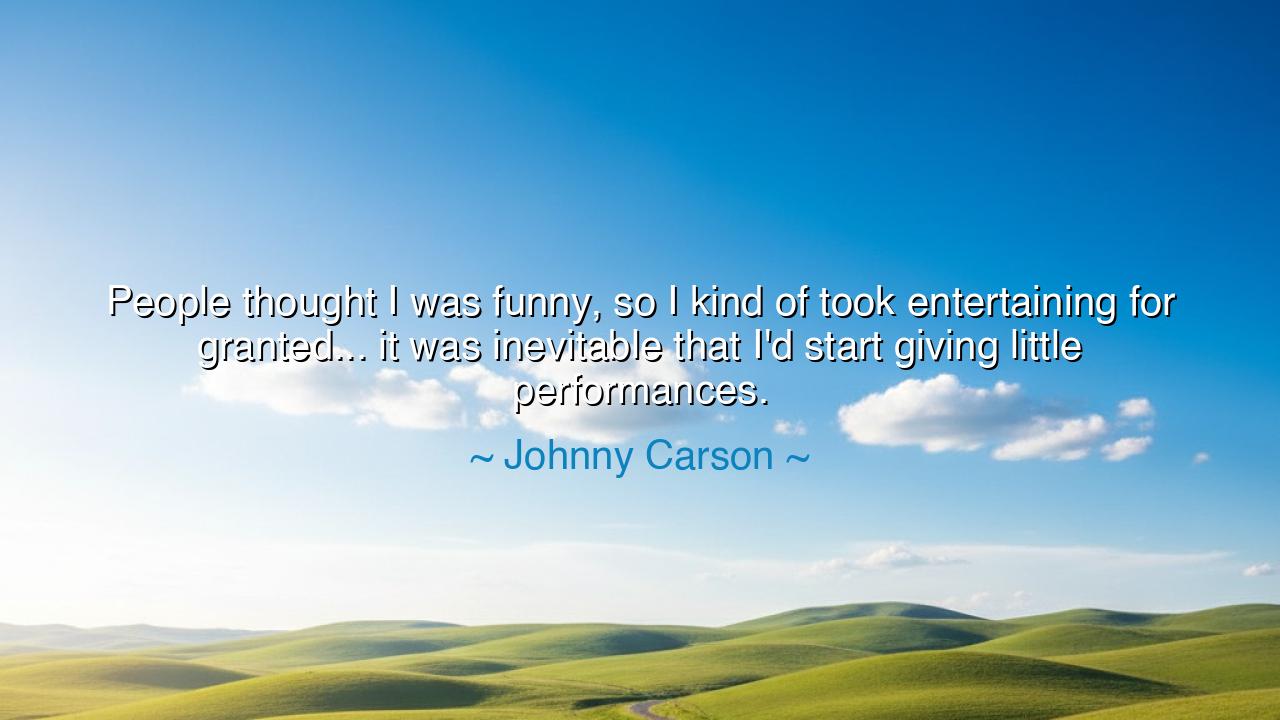
People thought I was funny, so I kind of took entertaining for
People thought I was funny, so I kind of took entertaining for granted... it was inevitable that I'd start giving little performances.






When Johnny Carson said, “People thought I was funny, so I kind of took entertaining for granted... it was inevitable that I’d start giving little performances,” he was not simply speaking of comedy — he was speaking of destiny. His words reveal the gentle unfolding of a soul discovering its purpose not through ambition, but through recognition. For some, the path to mastery begins with struggle and rebellion; for others, as with Carson, it begins with the natural grace of being seen. His remark is humble, yet profound: that sometimes what we are meant to do in life comes not through design, but through the effortless blooming of what has always been within us.
In the ancient world, philosophers spoke often of daimons — inner spirits or divine guides that whispered each person’s true calling. Socrates said he had one, a voice that restrained him from straying off his path. In Carson’s reflection, we hear the echo of that same idea. He discovered that people found him funny, that laughter seemed to arise wherever he stood, and so he began to give performances, not from calculation but from the pull of the natural order. His gift was not something he chased, but something that chased him. This is the mark of true vocation — when talent feels less like an invention and more like a remembrance.
And yet, within his words lies a note of caution. He says he “took entertaining for granted,” as though even great gifts can fade in our awareness if left unexamined. The ancients warned of this too. The poet Hesiod wrote that the gods often hide excellence in plain sight, and that mortals who fail to cherish their gifts risk losing them. What comes easily may seem ordinary to the one who holds it, but to others it is a wonder. Carson’s humility reminds us that even natural talent demands reverence — that ease does not mean insignificance, and that the light we carry must be tended or it will dim.
Consider the story of Mozart, who, like Carson, seemed born for the stage. As a child, he astonished the courts of Europe with his genius, yet for him, music was as natural as breathing. He played and composed because he could not help it, because melody lived in his blood. And like Carson, he might have taken that gift for granted — until hardship and rejection revealed its deeper meaning. It was through struggle that Mozart came to understand that his art was not merely talent, but a calling that required devotion. So it is with all who are blessed with gifts — what begins as instinct must mature into intent.
Carson’s reflection also speaks to the power of encouragement. It was the laughter of others — the recognition of his charm — that shaped his destiny. The praise of his audience became the soil in which his confidence grew. This, too, is a lesson for us: to speak life into the gifts of others. The ancients believed that words could shape reality, that to call someone “wise,” “strong,” or “funny” was to draw that truth forth from within them. Thus, every time we recognize another’s gift, we help them hear their inner voice more clearly. Carson’s journey began because others saw in him what he could not yet see in himself — and so should we become mirrors for one another’s potential.
But there is another layer still — the inevitability of expression. Carson says it was inevitable that he would start performing, as though the seed of his destiny could not remain buried. This reveals a deep truth of the human spirit: that what is genuine cannot be contained forever. The writer must write, the healer must heal, the leader must lead, and the fool — blessed be — must make us laugh. When the soul is aligned with its gift, it will find a way to manifest, no matter how the world resists. To deny one’s calling is to live in quiet suffocation. To embrace it, even in small ways, is to participate in creation itself.
Thus, the lesson in Johnny Carson’s words is not only for those who seek fame, but for all who wish to live authentically. Do not ignore what comes naturally to you, even if it feels small, even if you take it for granted. What flows from you without force is often the whisper of your truest nature. Honor it. Nurture it. Let it find its stage, whether before millions or before one. For when you live according to your gift, the universe itself becomes your audience, and your life — like Carson’s — becomes a performance not of pretense, but of truth.
And so, dear listener, remember: the laughter of others may reveal your purpose, but it is your gratitude and dedication that will keep it alive. The gift that feels effortless is not to be wasted — it is a trust, a sacred fire. Carry it with joy, refine it with patience, and share it generously. For as Johnny Carson teaches, destiny is not always discovered through striving, but through the quiet recognition that what you were meant to do has been with you all along — waiting for you to finally step into the light and begin your own little performance.






AAdministratorAdministrator
Welcome, honored guests. Please leave a comment, we will respond soon